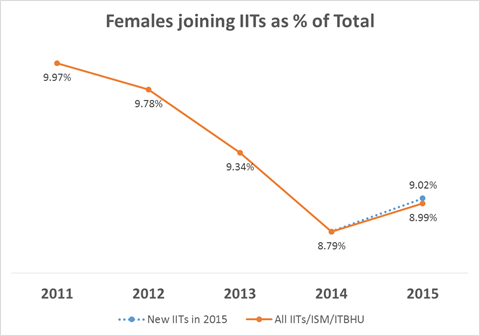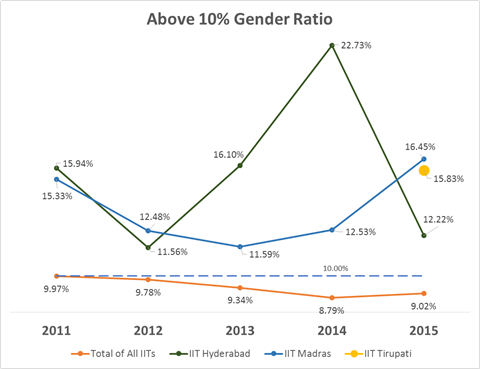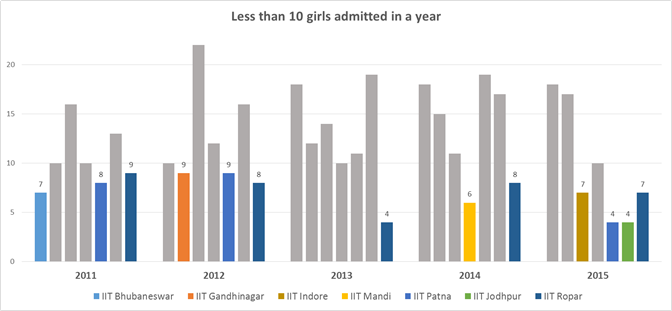Last month, the JEE (Advanced) conducting authorities
released a set of data reports on the final results of the JEE (Advanced) and
its previous avatars, from 2011 onwards. In this set of analysis of these
reports, we will discuss individual elements of the reports and how they are
shaping up for you.
In Part 1, we discuss the declining and abysmal gender ratio
in the admissions to the IITs. The institutes are: IIT Bhubaneswar, IIT Bombay,
IIT Delhi, IIT Gandhinagar, IIT Guwahati, IIT Hyderabad, IIT Indore, IIT (BHU)
Varanasi (Until 2012, known as IT-BHU), IIT Kanpur, IIT Kharagpur, IIT Madras,
IIT Mandi, IIT Palakkad, IIT Patna, IIT Jodhpur, IIT Roorkee, IIT Ropar, IIT Tirupati,
and ISM Dhanbad.
The total seats filled during this period were:

Note: IIT Palakkad & IIT Tirupati started operations in
2015. All other 17 institutes were operational as of 2011. Row 2015A shows the data for these 17 IITs
only, and Row 2015B shows data
inclusive of the two new IITs.
The old IITs have shown a consistent fall in the percentage
of females joining them since 2011. The maximum percentage was observed in
2011, at 9.97%. Since then, the percentage fell consistently till 2014. In
2015, the percentage improved marginally. If we remove the new IITs that
started operations in 2015, the percentage drops by 0.02%.

Of the 17 institutes old institutes, only IIT Hyderabad and
IIT Madras have been successful in getting over 10% of female students
consistently. This is in stark comparison with the total, which has never
crossed 10% at all. Of the two new IITs, only IIT Tirupati has admitted more
than 10% female students.

There have been 13 instances in the 17 IITs (19 in 2015) across
all years 2011-2015 when less than 10 female students were admitted in a
specific institute.
IIT Ropar is the biggest culprit here, having never admitted more than 9 students in any year. IIT Patna comes second with 3 instances (2011, 2012 & 2015). All the other IITs in this list – IIT Bhubaneswar, IIT Gandhinagar, IIT Indore, IIT Mandi, and IIT Jodhpur – have had one year each when they did not cross double digit female admissions.
2015 is the worst year on this record, since as many as 4 institutes – IIT Indore, IIT Patna, IIT Jodhpur, & IIT Ropar have been unable to admit more than 7 female students. 2013 was the best year on record, with only IIT Ropar admitting just 4 female students.

What such abysmal ratios mean for the engineering sector in
India, and Indian society as a whole, is a story beyond the scope of this
article. We will continue to publish such small snippets of analysis from the data
released by JEE (Advanced) through this week. Stay tuned for more.
